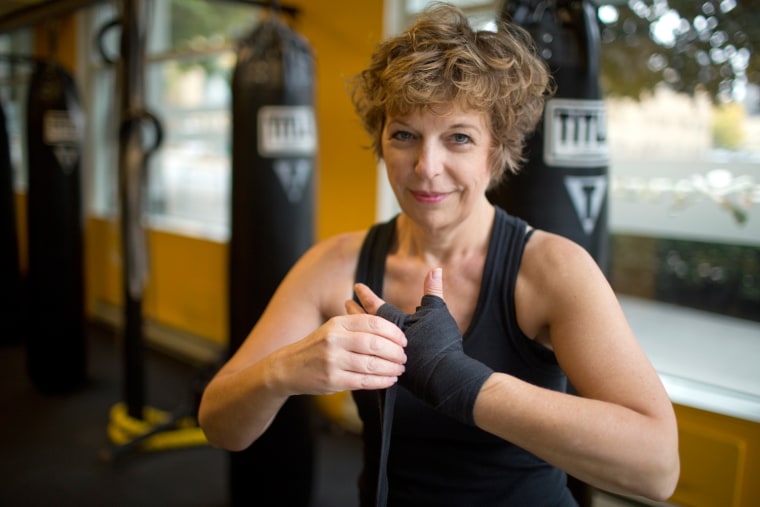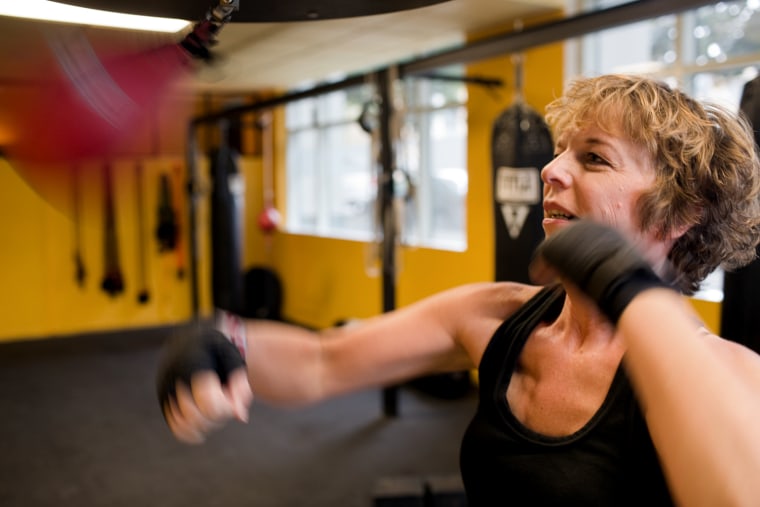
There's nothing like having cancer to make you appreciate the little things in life -- like buying shampoo, running a few miles or being able to forget the address of the hospital where you were treated.
After I was diagnosed with breast cancer in February 2011, I felt like I lived at that hospital. Today -- a year out from treatment -- it's in the rear view mirror, along with the double mastectomy and debilitating chemo and radiation I wrote about last October on TODAY.com.
Not that there aren't still plenty of daily reminders regarding my year of living cancerously: chemo brain, adhesion pain, hot flashes (courtesy of my new BFF tamoxifen) and, oh yes, my board-flat Olive Oyl chest.
But there have been good, uh, developments, too.
The biggest one -- for me -- is that I now have hair. For those of you who think baseball is slow and tedious, all I can say is try watching hair grow sometime.
I disguised my bald head with a wig from mid-June until New Year's Eve then gratefully ditched it, along with the tape, the itchiness, and the constant fear that I'd accidentally spin the thing around backwards while swing dancing like some character on Gilligan's Island.
Passing as ... French
Come January, I let my freak flag fly and began rocking a dark gray micro pixie.
"With the wig, I was trying to pass as a healthy, normal woman," I joked to my friends about my super short 'do. "Now, I'm trying to pass as French."
Today, I don't worry so much about passing. I finally have my old color back and a somewhat normal-looking hairstyle. Although the word "style" may be pushing it. My new hair is a mass of unruly chemo curls, the type of curls I used to spend long hours (and big bucks) trying to achieve with body perms and hot rollers.
'Chemo curls' another kink in cancer recovery
That's the good news.
Well, that, and the fact I'm no longer a chemo invalid, hobbling around my apartment hanging onto chairs and using pliers to open a bottle of water (although my new hobby, boxing, sometimes leaves me feeling this way). Nor am I getting zapped by radiation every day, then coming home to slather greasy ointment all over my lobster red chest in an attempt to keep the skin from peeling off.
I've been running for months; ditto for boxing and swing dancing. I have my strength, my appetite, my healthy skin and my hair back (well, most of it, anyway - RIP, dear eyebrows).
I've finally kicked treatment to the curb.
But being done with cancer treatment and being done with cancer are two very different things. That's the bad news.
I remember feeling almost giddy as I waltzed into my oncologist's office last November, finally done with five grueling months of chemo and radiation. Surely, there was a certificate waiting for me with a huge "CANCER-FREE!" stamp beside my name.
Unfortunately, that's not exactly how things work in the cancer club.
"I'm sorry," my oncologist told me when I asked her point blank if I was cured. "But we don't really use the C-word."
Instead, they do quarterly blood tests to look for tumor markers. They do physical exams to make sure I haven't developed a persistent pain or nagging cough. They do a scan now and then to check up on weird anomalies like lung nodules and liver cysts and to make sure my uterus is still "unremarkable" (a backhanded pathological compliment I've come to appreciate).
Life in Limbo Land
In a nutshell, they wait and see if the cancer comes back.
And I wait with them, living my life with one foot firmly planted in the real world and one foot shakily set in what I call Limbo Land.
Am I cured? They don't know. Am I going to have to go through the whole bloody mess again? They don't know.
"It's after treatment that some people have the hardest time coping," Mindy Greenstein, psycho-oncologist, author and former breast cancer patient, told me when we chatted about this strange new terrain. "You're dumped back into your regular life but it's very different. You don't feel like you're actively fighting something. You just have to live with it."
But living with a cancerous question mark hanging over your head isn't easy. Your friends and family are sick of hearing about it. Sick of worrying about it. And even simple questions like "How ... uh ... are you?" are fraught with dark nuances.
"I'm fine -- as far as I know," I usually tell people, going into what I call my Chuckles, the Cancer Clown routine. "I've forgotten how to spell, I've eaten so many cruciferous vegetables I've practically got cauliflower ear and my chest still looks like one of the talking trees from Wizard of Oz. But I'm not dead!"

When I asked Greenstein how she copes with the fear of recurrence, of mets (not the baseball team but the metastatic spread of breast cancer), of some harsh new disease brought on by treatment, of her own mortality, she said she uses different approaches.
"Sometimes I think of all the worst things that can happen and how I would handle them," she said. "Other times, I'm a positive thinker. Whatever works in the moment, that's what you go for."
I guess that's where the boxing comes in.
For me, it's a healthy way to work off the rage I still feel over my diagnosis and treatment, which is sometimes hard to distinguish from the tortures they used to inflict on suspected witches back in the day. Knowing how to throw a punch is also an effective way to keep people from telling me how "lucky" I am I had breast cancer because now I can get big new beautiful boobs.
Yes, distractions like running, boxing, blogging, swing dancing and even dating have worked well for me.
Not that there aren't the occasional grating moments.
"So when are you going to get your new tits?" one guy asked a while back over drinks.
"Excuse me?" I said, laser beams shooting out of my eyes.
"I'm sorry," he quickly apologized. "When are you going to get your new breasts?"
He's hardly the first person -- or the first date -- to ask about the girls. Lots of people do, probably because I was so adamant -- and so public -- about not wanting to lose them in the first place.
Now, at nearly a year post-radiation, it's time for me to figure out what I want to do about reconstruction, a process far more complicated than your run-of-the-mill boob job. But more surgery? More recovery? More pain? More drains? Once again, my body's due for a transformation my mind's not quite ready to embrace.
"If you've been out having a normal life, the thought of making yourself a patient again is very difficult," Greenstein told me when I confessed my hesitation about going back under the knife. "One way of coping is to look at this as the next thing on the way to getting your full life back."
And I do want my full life back. Not to mention my full bra back.
I'm tired of wearing my V-necks backwards, of misplacing my gummi, department store boobs on top of the dresser, of experiencing yet another wardrobe malfunction at the gym ("Ricky" has a tendency to migrate over to "Lucy's" place if you know what I mean).
I miss my old carefree self, my old carefree life, where a bad headache or weird leg pain didn't routinely morph into metastatic breast cancer at 3 a.m. I'm just not sure if new girls are going to help me get it back. I'm not sure what, exactly, is going to help me get it back. To put those fears -- irrational and otherwise -- to bed for good.
And so I box. And run. And offer advice to newly diagnosed women. I fret about lymphedema and send out tweets about the latest research on this sleeping beast that inexplicably comes to life in our breasts.
I read. I write. I kick myself when I forget to put sun block on my irradiated chest. I laugh with my sisters until I nearly pee my pants and flirt with inappropriately young men. I listen to inspiring stories from survivors and try to spin a few myself.
I sing loudly but listen for dark whispers. Like the rest of us in this lousy club, I keep slogging ahead.
Diane Mapes is a frequent contributor at NBCNews.com and TODAY.com. She's the author of "How to Date in a Post-Dating World" and blogs about breast cancer at www.doublewhammied.com.
More from TODAY.com contributor Diane Mapes:
Cancer kiss-off: Getting dumped after diagnosis
Mastectomy and the single girl: A bucket list for boobs
Dating after diagnosis: Love in the time of chemotherapy
Related:
Five years after cancer, an emotional Hoda thanks her doctors